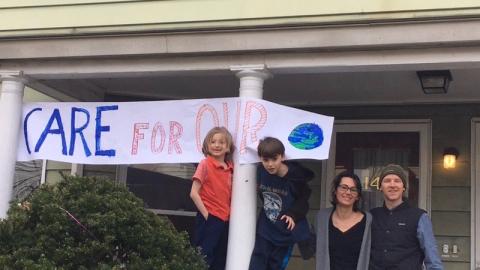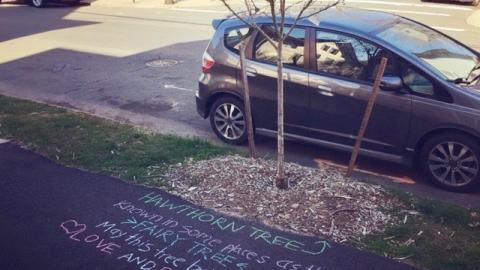Each April, the F&ES-based Urban Resources Initiative convenes a team of cyclists, from across the School community and beyond, for the Rock to Rock Earth Day Ride, a New Haven event that has raised more than $1 million for local environmental organizations since 2008.
The Rock to Rock ride, which was scheduled to happen tomorrow, will look significantly different this year, of course. But it is still happening. Rather than bike across New Haven as usual, the URI team — like most of the other 30-plus partner organizations — is encouraging riders to find another way to support the cause while following guidance on social distancing.
We chatted with Anna Pickett ’10 M.E.Sc., the development and outreach manager at URI and a longtime organizer of the Rock to Rock event, about how individuals can participate in this year’s event — and how they can continue to support organizations like URI.
This has been a challenging spring for URI given that so much of what you do involves community-oriented work and collaborating with partners on outdoor projects across the city. Not being able to do the Rock to Rock ride, which is such an important event for the organization, at least not as you normally would, is another frustrating blow.
Anna Pickett: Yes, this has all forced us to stretch our imaginations to figure out what a lot of our activities will look like, for sure. This event, in particular, is based entirely on gathering together as a community. But we’re still going to pull it off virtually.
What are some of the ways that you’re encouraging people to participate virtually?
Pickett: There are a couple of different suggestions that we’ve made. One is that they do a bike ride solo or with their immediate family. We’ve advised people to make those rides short so that they’re not a burden on the communities they travel through. Also they should pack all the water and snacks they’ll need, make it short enough that they won’t need to take a bathroom break, and take a tire repair kit and all that. They can also take a hike up to the top of one of the summits of West Rock or East Rock. And then there's the option of taking action from home, like calling or writing to their senators or other officials to remind them that we’re still in a climate emergency.
People can also decorate their homes. My kids and I decorated our trees with ribbons and crepe paper, made signs, put chalk on the sidewalk, labeled our tree. I saw someone on social media was going around with chalk and labeling all the trees in their neighborhood, and was inspired to do that here, too. It’s easy to do this in New Haven since all our street trees can be identified on
URI’s street tree map.
However people decide to participate, we hope that they will share photos or video of
theirversion of Rock to Rock on social media, using the hashtag #MyRocktoRock or #RocktoRock2020.
This event is also a big fundraiser for URI and so many other environmental groups. Are you still able to do that?Pickett: Yes, we are. Amazingly, most of our sponsors have stuck with us through this. We explained to them how things were changing and how many of the perks we provide to the sponsors has to change — the city isn’t going to put up our big banners featuring the top sponsors, for example. And we’re not going to print out a thousand tee-shirts.
But the fundraising will continue through midnight on April 25. So we’re trying different things in order to attract donations, including peer-to-peer fundraising. I know a couple of teams are making knit hats for all their donors or baking cookies. URI’s team captain Chris Ozyck is giving away perennials from his garden and shout-outs to his donors
in each of the videos he is creating as part of his Rock to Rock challenge, “50 days, 50 videos, for 50 years of Earth Day.” Myself, I’m writing the lyrics to a song that will incorporate everyone who donates.
Amazing. You’re writing a song! Pickett: It’s something that my family likes to do. Every summer we rewrite the words to a different song, so this year we’re going to do it a little earlier in support of Rock to Rock. I’ll have this extra challenge of trying to fit a lot of names into the lyrics.
Beyond bringing together people from across New Haven, Rock to Rock helps support the work of URI and so many great organizations. And that is particularly important right now.
Pickett: Our work at URI, of course, is very much seen as an environmental project, but it’s also a social justice project. We know that some of the people that we work with — including our partners at EMERGE and our high school team — have barriers to employment. So, for them, the specialized paid training we provide is very important. When we started to realize that everything was going to shut down and we were going to have to delay our spring planting season, my first concern was for our crew. Our GreenSkills tree planting program is very much like the Green New Deal of New Haven, and it’s been going since 2007.
What’s important is that this actually contributes to helping people sustain themselves and to have an impact that will help us all thrive through this time.
 The Picketts celebrate Earth Day at their New Haven home.
The Picketts celebrate Earth Day at their New Haven home.
